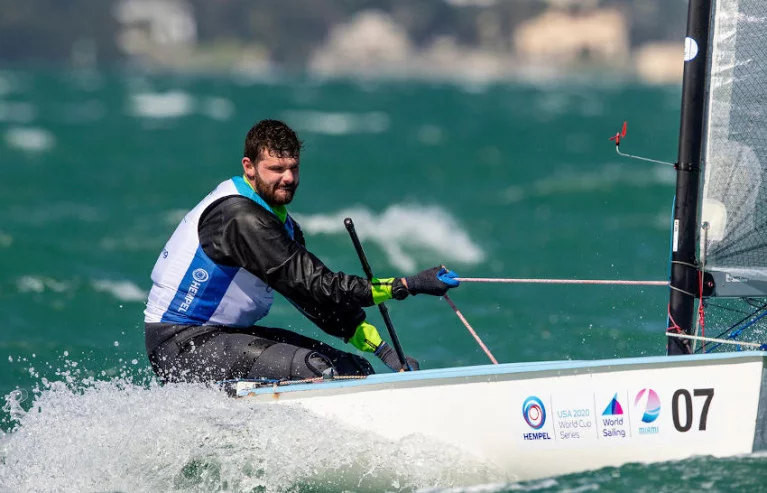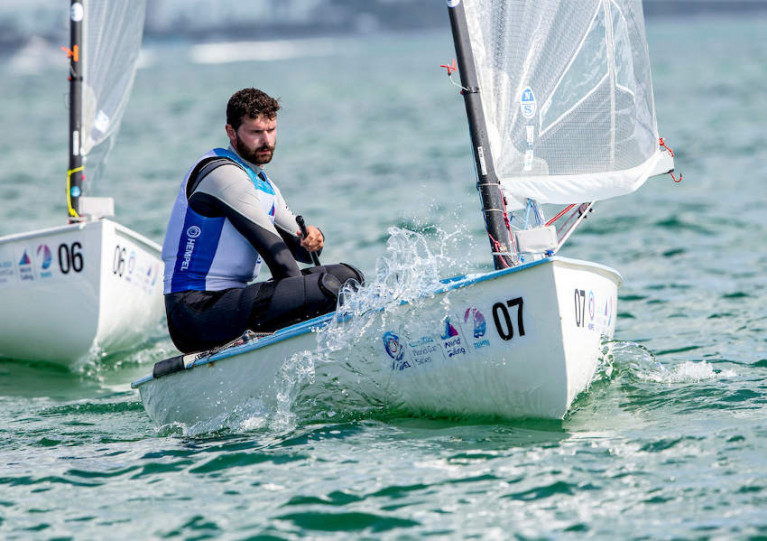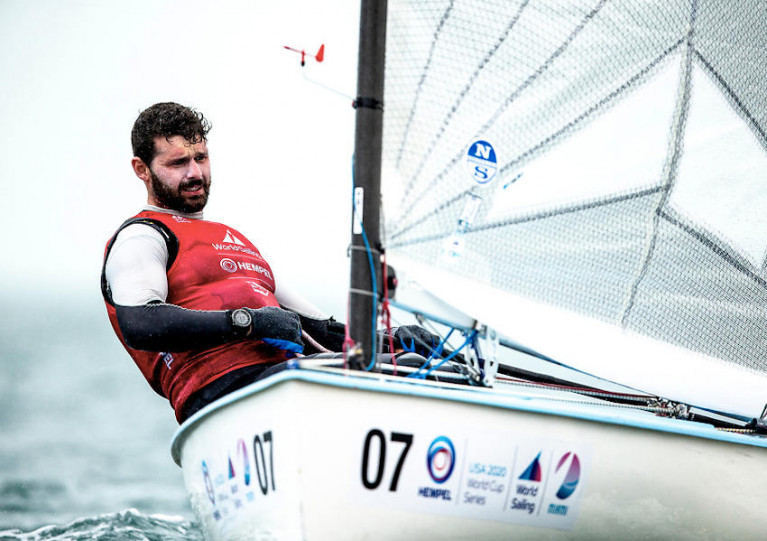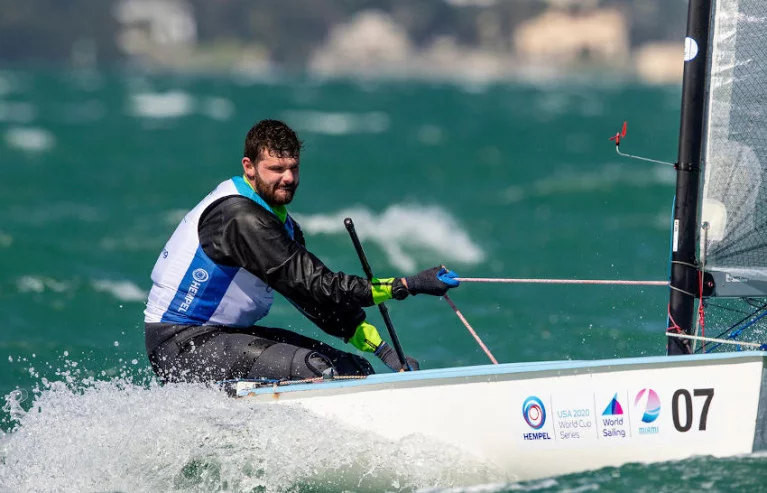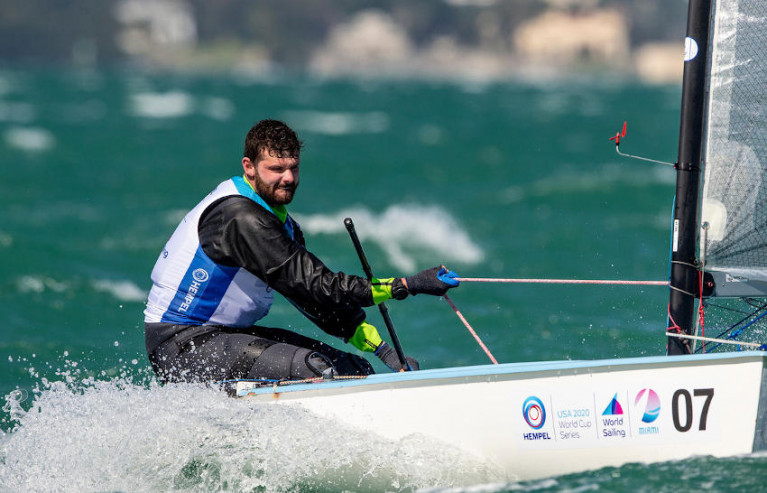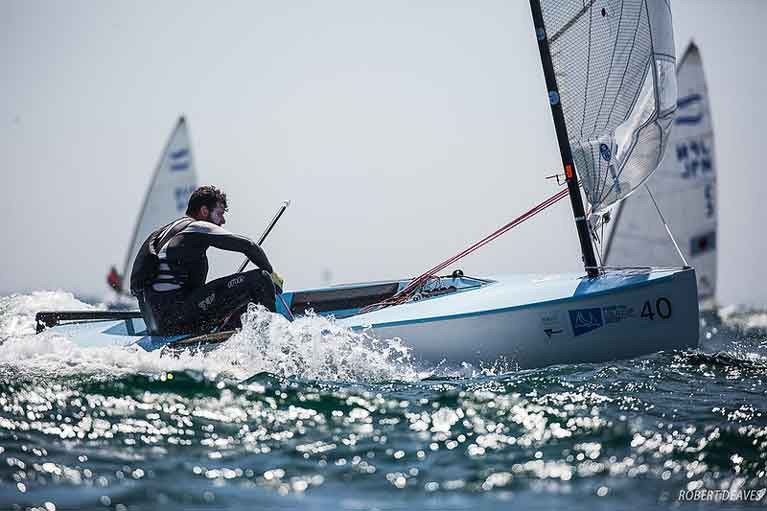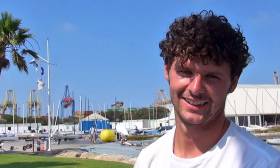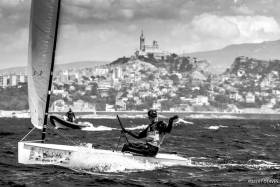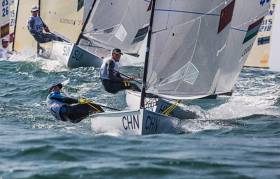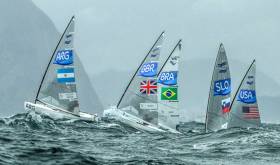Displaying items by tag: Finn
RYANI Congratulates Oisin McClelland On Miami Finn Result
The RYANI has congratulated Donaghadee sailor Oisin McClelland on his strong showing at the Hempel World Cup Series in Miami last week.
As previously reported on Afloat.ie, the Finn sailor from Northern Ireland finished fourth, just shy of the podium, after Saturday’s (25 January) medal race on Biscayne Bay.
RYANI chief operating officer Richard Honeyford said: “Oisin sailed well throughout the week in Miami. He secured three top three finishes in the 10-race series and really showed his skill in the stronger breeze.
“While he narrowly missed out on the bronze and a podium place in the end, Oisin’s hard work and training throughout the year really paid off.
“He is a fantastic role model for our young sailors and at RYANI we look forward to supporting Oisin as he continues in his campaign for the Tokyo Olympics.”
McClelland will have one more last chance to claim a spot in this summer’s Tokyo Olympics at the final European qualifier, the Hempel World Cup series event in Genoa, Italy from 11 April.
Oisin McClelland Just Shy Of Bronze In Miami Finn Medal Race
Northern Ireland’s Oisin McClelland was resurgent on the waters of Biscayne Bay yesterday (Saturday 25 January) but finished just shy of the podium after the Finn medal race at the Hempel World Cup Series Miami.
The Donaghadee Sailing Club stalwart finished fifth in the final, ahead of Luke Muller of the USA whose points total over the week was enough to secure the bronze for himself.
As previously reported on Afloat.ie, American Caleb Paine had already won Finn gold ahead of the weekend with his unassailable lead over Canada’s Kyle Martin, who took the silver medal and finished second in yesterday’s race.
McClelland will have his last chance to claim a spot in this summer's Tokyo Olympics at the Hempel World Cup series event in Genoa, Italy from 11 April.
Yesterday's Finn medal race can be watched back in full below:
Oisin McClelland Stands Fourth Heading Into Finn Medal Race In Miami
Northern Ireland’s Oisin McClelland was off form on Friday (24 January) on Biscayne Bay as two seventh-place finishes saw him slip from the third place he’d held in recent days to fourth overall, heading into the Finn medal race at the Hempel World Cup Series event today (Saturday 25 January).
The fifth and final day of fleet racing wrapped up with the light breeze posing more challenges for the 182 sailors from 45 nations across the 470, RS:X, Laser, Laser Radial and Finn fleets — and testing the nerves of those with so much at stake.
Friday’s weather forecast was mostly sunny with temperatures in the mid-20s C. The breeze was on the low end throughout the day in the 5-6 knot range, and prompted a lengthy postponement in the afternoon, following which only the Finns were able to complete their racing schedule.
However, Caleb Paine of the United States has already won Finn gold ahead of the medal race as he has an unassailable lead over Canada’s Kyle Martin.
Across the 10-race series, Paine has taken five race wins and four seconds. An 11th in Race 9 yesterday was his worst score of the week. Martin of Canada won Race 10 and now stands in second place. while Luke Muller (USA), who is even on points with Martin, is in third.
McClelland of Donaghadee Sailing Club now stands in fourth, three points behind Muller in the overall Finn standings, following his worst performance of the week after Race 1, since which he’d consistently finished in the top five (excepting a discarded eighth in Race 8) and even scored a first place in Race 6.
But overall his week in south Florida is sure to boost his confidence going into the Genoa World Cup and the European continental spot for the Tokyo Olympics this summer.
“I’m 100% focused on that and this event is a good warm-up,” he said earlier this week.
Today’s medal races will be available to watch live on YouTube starting just after 9am in Miami (2pm in Ireland), with the Finns currently scheduled to start at 11.24am local time (4.24pm Irish time).
Oisin McClelland Holds Third In Finn Fleet As Light Wind Hampers Hempel World Cup Series In Miami
Northern Ireland’s Oisin McClelland maintains third place in the Finn class at the Hempel World Cup Series in Miami as cold temperatures, wind chill, rain, strong breeze, and more typical South Florida conditions challenged the 182 sailors from 45 nations yesterday (Thursday 23 January).
The challenge has been real on Biscayne Bay and this has created exciting racing and a level of unpredictability adding more intrigue to the annual Olympic class regatta.
Heading into Day 4’s racing yesterday, the Finn, Laser, Laser Radial and Men’s and Women’s 470 had completed six races, while the Men’s and Women’s RS:X finished nine.
However, the breeze failed to co-operate for most of Thursday, as rain showers sporadically dampened the sailing venue, and racing was limited after lengthy postponements.
American Caleb Paine won his fourth race of the regatta in Race 7 of the Finn class. He was third in Race 8 and leads by 17 points over Luke Muller (USA). Oisin McClelland of Donaghadee Sailing Club holds on to third, just two points behind Muller.
Meanwhile, the RS:X women and men managed just one race each, as did the Laser class. There was no racing in the Laser Radial or the 470 fleets.
Additional races are scheduled for the 470, Laser Radial and Laser today, Friday 24 January, with an earlier start time of 10.30am local (3.30pm Irish time).
Oisin McClelland Third In Finn Class Amid Unexpected Miami Conditions At Hempel World Cup Series
The 182 sailors embraced the challenge of the uncharacteristically cold and blustery conditions in Biscayne Bay on Day 3 of the 2020 Hempel World Cup Series Miami yesterday (Wednesday 22 January).
The athletes were faced with similar conditions on Tuesday, but Wednesday's overall shifty conditions and wind chill presented an even greater test of their physical and tactical skills.
Northern Ireland’s Oisin McClelland is in third place in the Finn class and trails American Luke Muller by three points. McClelland won Race 6 and placed fourth in Race 5.
“I managed to come out with a fourth and a first. A few people tipped it in, but I managed to stay upright and took the win,” said the Donaghadee Sailing Club stalwart.
Miami is the final opportunity for North Americans to qualify for Tokyo 2020, but the final stop of the 2020 Hempel World Cup Series in Genoa is the last shot for Europeans — McClelland included.
“The major goal for me is the Genoa World Cup and the European continental spot. The only one left for Europe. I’m 100% focused on that and this event is a good warm-up. There’s a couple of us here who are going for the spot — Ukraine and Russia. It’s a good early test to see how we’re going.
“We had some goals in mind for what I wanted to get out of this regatta — technique wise — but if the week goes well then I'd be really be pleased with a podium.”
Racing resumes at 11am EST (4pm Irish time) today, Thursday 23 January.
Northern Ireland Finn Sailor is 32 from 60 at Gold Cup in Australia
Josh Junior has become the first Kiwi to ever win the Finn Gold Cup after an epic medal race in Melbourne, Australia. Nick Heiner, from The Netherlands, took silver while 2018 world champion, Zsombor Berecz took bronze. Ireland was represented by Tokyo Olympic campaigner Oisin McClelland from Dongaghdee who has been seeking a Tokyo berth since 2016. He finished 32nd from 60 in Melbourne.
Earlier in the day, Ed Wright, from Britain, won the final race for the rest of the fleet, from Oskari Muhonen, from Finland and Jonathan Lobert, from France.
Even though he went into the medal race with a 16-point advantage over Heiner, Junior kept everyone guessing until the later stages of the race. He made hard work of the start, engaging with Heiner with a minute to go, but then allowing him to escape and control the start to lead up the first beat.
Starting in 20-22 knots, the wind gradually increased, as did the sea state, producing some epic racing conditions and supreme boat control. Heiner made the best of the first beat to round with a nice lead with Junior about sixth. Nothing much changed downwind, but a big shift to the left on the second upwind left Australia’s Jake Lilley in the lead followed by Berecz and Heiner. Junior was still back in seventh after losing out on the right.
While Lilley got away to win the race and move up to fifth overall, Berecz and Heiner battled downwind for silver and bronze. Berecz picked up a monster wave just short of the line and surged ahead, but Lilley was too far ahead to catch.
A mistake by Junior at this stage would have cost him the title, but he maintained control down on the final hairy downwind, to cross the line to whoops of joy. He had rewritten the history books, and despite a long line of celebrated Kiwi Finn sailors, he had become the first one ever to win the Finn Gold Cup.
Apart from Friday’s tricky races Junior was never out of the top five, leading from Day 2 all the way to the nail-biting finale. He entered the class in 2013 and has threatened brilliance ever since. But the years of hard work with Andy Maloney and coach Andrew Murdoch has finally paid off. It is an understatement to say he was pretty pleased with himself.
"I had a big lead but, to be fair, Heiner did a really good job at the start and on the first beat and he sort of got away on me. I was a bit worried I was in trouble of losing the whole regatta but I managed to hold it together and get the result I needed and I'm absolutely over the moon.”
"I have never won a world championships or even a medal so I'm stoked. There have been a lot of successful sailors in the Finn for New Zealand in the past and to be one of those is a great honour."
"It's been an outstanding week. I seem to have put pretty consistent results together and that's seen me near the front and took a bit of pressure off. But it's certainly a bit nerve racking. I have never been leading a world championship before, especially for so many days.”
His win makes the job of the Kiwi selectors much harder. Maloney had a better 2019 season and was selected for the test event, but a world champion is a world champion.
"Obviously Andy and I are really good mates and really good training partners and I was a bit gutted to see him not get on the podium today. But I think he still ended up with a good result. We will have another few regattas and, whoever ends up doing the best out of us will go to the Games and hopefully win a gold medal there.”
Another sailor hoping for a possible Tokyo selection now is Lilley, who has clearly had an amazing week with the medal race win and fifth overall.
“This week I tried to start slowly and consistently to not put any big points on the board and slowly built throughout the week and climb. I sort of clicked it up one gear each day as the regatta went and climaxed with the medal race win. I’m very happy with that and it’s a solid result in the lead up to Tokyo 2020.”
“It was important to go out and have a strong race today and set a mark so that everyone understands that we are coming for Tokyo 2020. I’ve had wins before or another good event, but I think this right now is the highest quality Finn fleet we have ever seen and it’s really tight at the top so anytime you finish top five or top ten is a great result.”
“To have the best fleet ever on Australian waters was really something special and Melbourne highlighted the fact that you have to be good in every aspect of this sport and the weather proved that here and I think the best guy came out on top. It was a fantastic event put on by Royal Brighton Yacht Club.”
Heiner was happy to consolidate his second place and secure the silver.
“It was an awesome medal race today. Breeze and nice waves and especially with the points from second to fifth, it was all to play for and with JJ well ahead, it was a bit of a hard one. He’s a match racer so I knew what was coming and I think I did a really good job of beating him off the line and had a good first beat and good first downwind and tacked on a nice lefty. The wind kept going left and made it a bit more exciting but luckily I still had Giles behind me and managed to chip away a little bit, and finished second overall, which I think is the best I could do today.”
“I’m pretty happy with the week. Looking back at the medal race at the Europeans in Cadiz where I lost the week on the medal race, we have come a long way since then and the training in Holland has paid off, and I felt pretty comfortable day today and I think that showed especially in upwind speed and sailing away on the downwind. So I think I definitely stepped up my game in the big breeze, so happy where we are going.”
“I think today everyone enjoyed the sailing. We loved it. I thought I would have the toughest job in the fleet, but I was pretty fast upwind and I didn’t make any mistakes, and it was not easy, but it was easier than I expected. There was a lot to gain or lose but I decided to save the bronze so I didn’t push too hard and risk a capsize and lose it all.”
“Before I came here my goal was to get a medal and I managed it so I am pretty happy. On the other had it was a magical week for Josh. He didn’t make mistakes, so there was noting we could do to beat him. I am happy that he managed to win the Gold Cup. Next time he meets Russell Coutts he has say’ I have something you don’t have.’ So I am really happy for Josh and thrilled to get third after a bad start to the week.”
While most of the places for Tokyo have been decided, one of the remaining places will generate a lot of interest. Many sailors are vying to win the remaining European place at the Genoa World Cup in April next year, where the the competition will be really tough. Several sailors have excelled this week including Croatia’s Nenad Bugarin, who has clearly benefitted from training with Berecz, and with coaching from three-time Olympian Pieter-Jan Postma. Bugarin finished in seventh.
Two places further back was Joan Cardona, from Spain, who also took the U23 prize ahead of Nils Theuninck, from Switzerland, and Luke Muller, from the USA.
“It’s been a great week for me. I had some ups and down at the beginning but I managed to finish top 10 and first U23 so I am really happy with my result and it just motivates me more to train as hard as I can to achieve the Olympic spot for Spain in Genoa next year.”
The 2019 Finn Gold Cup is in the books, and it will go down as one of the most competitive world championships for a while, with the first ever Kiwi winner. It also sets the scene for the coming eight months with everyone trying to find form or consolidate their performance ahead of the Olympics. After finishing in fourth, Olympic champion Giles Scott, from Britain said, “This week will serve as a bit of a wake-up call.” After some of the performances this week, that thought will be shared by many heading of those to Tokyo.
Results after medal race (medal race results in brackets)
1 NZL24 Josh JUNIOR 44 (7)
2 NED89 Nicholas HEINER 52 (3)
3 HUN40 Zsombor BERECZ 53 (2)
4 GBR41 Giles SCOTT 67 (8)
5 AUS1 Jake LILLEY 72 (1)
6 NZL61 Andy MALONEY 79 (9)
7 CRO10 Nenad BUGARIN 92 (5)
8 CAN18 Tom RAMSHAW 95 (10)
9 ESP26 Joan CARDONA ÉNDEZ 98 (6)
10 TUR21 Alican KAYNAR 100 (4)
Full results here
Ulster's Oisin McClelland Ready for Finn Gold Cup in Melbourne
Christmas only comes once a year, but for one Finn sailor Christmas will come early this year, with one of the most prestigious and famous trophies in sailing there for the taking over the next six days at the 2019 Finn Gold Cup, sailed from the Royal Brighton Yacht Club, in Melbourne, Australia.
Ireland is represented by Tokyo Olympic campaigner Oisin McClelland from Dongaghdee who has been seeking a Tokyo berth since 2016.
After weeks of preparation and training on Port Philip, the 62-strong fleet from 23 nations is ready for action. The training conditions have been awesome so far but are predicted to get even better as the event begins with a change to warmer and sunnier weather and reliable sea breezes. But it never pays to predict to far ahead in Melbourne.
The practice race on Sunday afternoon was sailed in a shifty 5 to 12 knots and as usual no one took it particularly seriously, but it marked the end of training and the start of the competition. While race leaders Nils Theuninck, from Switzerland and Markus Whitley, from Australia pulled out at the gate, Jesse Kylänpää, from Finland took the win from Mark Jackson, of Australia.
One of the favourites next week is Nicholas Heiner, from the Netherlands. He won the last major regatta, the Sailing World Cup in Enoshima, in August. A Dutch sailor has never won the Finn Gold Cup, but after a very close third in 2017 and a sixth in 2018, Heiner has got closer than most. Despite winning in Enoshima in 2017 and 2018, a major win still eludes him, though he has been threatening to take one for the last two years.
He has been enjoying the Port Philip conditions in the run up to the Finn Gold Cup. “We’ve done about 15 days training in total this year, plus time at the end of last year, so we’ve been here plenty over the years. It’s always been good. It’s a real treat to come here, with pretty efficient training and always a nice breeze.”
“The last two weeks have been glamour, not much light wind but everything between 6 and almost 30 knots, so it’s been good, and the last few days with an amazing thermally enhanced gradient breeze and nice waves, so definitely a good place for the Finn.”
“It’s a bit cooler than usual though. We had one day with 42 degrees and 40 knots out of the north, and it did a big switch to the south-west and within half an hour was 18 degrees and 52 knots, so definitely a place of extremes. This week has been cold and next week will be will be nice and warm for us.”
He said the training had gone well with many sailors taking part. “It’s actually quite nice to see a lot of different guys at the front and I think Nils made a good step up. He has been training with us and we taught him one or two things. But I would say everyone has been up there. No one has been dominating in training.”
One of the teams using the event for Olympic selection is the USA. The team here includes the 2016 bronze medallist Caleb Paine and young hopeful Luke Muller.
Muller said, “I came pretty early last month and just wanted to get comfortable here and I am glad I did. The first two weeks I was pretty useless because of the time change. But it’s been really great to line up against everyone who has shown up, and just trying to really get comfortable in the conditions. It was a big priority for me to be prepared here and feel good and just feel at home.”
As is usual in the Finn class, the sailors have been training together on the water, but over the last few weeks the group has been growing, with practice starts organised most days. “It’s been really collaborative with everyone organising together the night before. We’ve had between 15 and 30 guys on the start line at once in training so it’s really been good to simulate what kind of starts we’re going to have and you get to line up alongside everyone you want to. It’s been great.”
“Rafa [Trujillo, the Australian coach] has been starting practice races and everyone has joined in. I think everyone has quite liked it.”
“When I first came it was 12-13 degrees and raining and really windy. But Melbourne has been treating us well since and hopefully it will continue. It looks like the forecast will be great.”
A Kiwi sailor has also never won the Finn Gold Cup in the 64-year history of the event. Two sailors who could well change that next week are Andy Maloney and Josh Junior, who have both been on top form all year. Earlier in 2019, Maloney won the Trofeo Princesa Sofia in Palma and the World Cup Final in Marseille and is relishing the chance to challenge for the Finn world title.
Maloney has not competed in the Finn since the test event in August but says they are prepared.
“We had a good break after Japan and we’ve been back in the boat a month or so now, so I guess it’s the start of another season for us and it’s the world championship. The Finn Gold Cup is a pretty special trophy and I think for me that’s a great incentive, so to try and win that trophy is a pretty cool opportunity.”
The pair have just finished a second week of training, with a week in between back in Auckland for “work”.
“We’ve done quite a bit of practice racing here now and it’s been pretty nice conditions so far. Usually some pretty good chop and waves and really close acing. And pretty decent shifts no matter what the breeze is, so definitely a fun race course trying to sniff out the shifts, and trying to do it better than everyone else.”
“All the usual names have had their moments, but generally it’s been the same guys out front as always the last year or two. Everyone has been pushing hard and everyone has had their moments.”
Racing is scheduled to being at 13.00 on Monday 16 December
The International Finn Association delegation to the 2019 World Sailing Annual Conference in Bermuda has returned empty-handed. The eight submissions to reinstate the Finn in the slate for the 2024 Olympic Games were rejected by both the committees and the Council.
The IFA is disappointed that it did not get the support of the World Sailing Council to debate and vote on its submissions. The submissions were very complex but that was necessary because of the complex World Sailing processes.
This complexity allowed people that didn’t support the Finn within World Sailing to influence the process and spread disinformation. All of this may have been resolved through the new governance reforms so it is disappointing that this was also rejected.
However, despite the rejections, the Finn class did receive a lot of advice and support from board members, councillors and committee members throughout the week, though unfortunately that support did not translate into votes around the table. What the Finn delegation did take from away the conference was that there is hope for a return, even if not at the current juncture. The overwhelming response from other delegates was that the Finn was an essential element of the Olympic Games and many hoped that it would return.
British sailor Hector Simpson made a heartfelt plea to the Equipment and Events Committees, speaking on behalf of the Finn Class submissions. As one of the many young Finn hopefuls that have lost their hope of sailing at the Olympics, he made a passionate and emotional case that struck a chord with many in the room. The Finn Class would like to thank him, as well as, Hungarian Finn sailor Doma Nemeth, for their time and energy over the past week.
The Finn Class looks forward to continue working with World Sailing as an Olympic Class over the coming months to make sure the 2020 Olympic Games is a huge success that showcases sailing and the Finn’s amazing athletes to the full.
World Sailing has a lot of questions to answer after this week’s conference and the class will carefully watch what happens next to find any opportunity it can to create opportunities for Finn sailors to compete at the 2024 Olympics.
Finn Class Makes Eight Submissions To World Sailing Conference To ‘Rebalance The Slate’ In Olympics
The Finn class has made eight submissions to the upcoming World Sailing annual conference in Bermuda in its efforts to ‘rebalance the slate’ of Olympic sailing.
This past summer the one-person dinghy class — which at least year’s conference was removed from the Paris 2024 Games onwards in favour of a mixed two-person keelboat event — suggested a number of ways in which sailing’s world governing body could close the gaps of opportunity for men over 85kg and lightweight women.
These include cutting the number of board events from three (which it says “is not representative of sailing as a sport globally”) to two, or replacing the mixed kite with the Finn. The class does not propose any conflict with the newly introduced mixed keelboat.
The proposals form the basis of the Finn class’ eight submissions, which are available on the World Sailing website and will be reviewed and discussed at the conference which begins this Saturday 26 October.
The Finn class has announced proposals to ‘rebalance the slate’ of Olympic sailing as it identifies a lack of opportunity for heavyweight men and lightweight women.
The mixed one-person dinghy class, which late last year was removed from the Games from 2024 onwards in favour of a two-person keelboat, says the decision now leaves men over 85kg with no chance of sailing at the Olympics.
But it also identified a gap for lightweight women whose opportunities have also been limited, it says.
The International Finn Association now says it is “working on a series of submissions for November to rebalance the Olympic events, providing options for both heavyweight men and lightweight women”.
It is being suggested that kiteboarding becomes a men’s event match by a windsurfing event for women, while the mixed two-person dinghy becomes a women’s event alongside a reintroduced one-person dinghy for heavyweight men.
“It will be a balanced slate that allows for the widest possible spread of participation across genders, weights and nations within the constraints laid down by the IOC,” the class says.
These proposals will form the substance of its submissions to World Sailing for the governing body’s November conference in Bermuda.
And the class is appealing for responses from interested parties to get involved at [email protected] “to help us build a better balanced and more representative slate of Olympic events for 2024”.


























